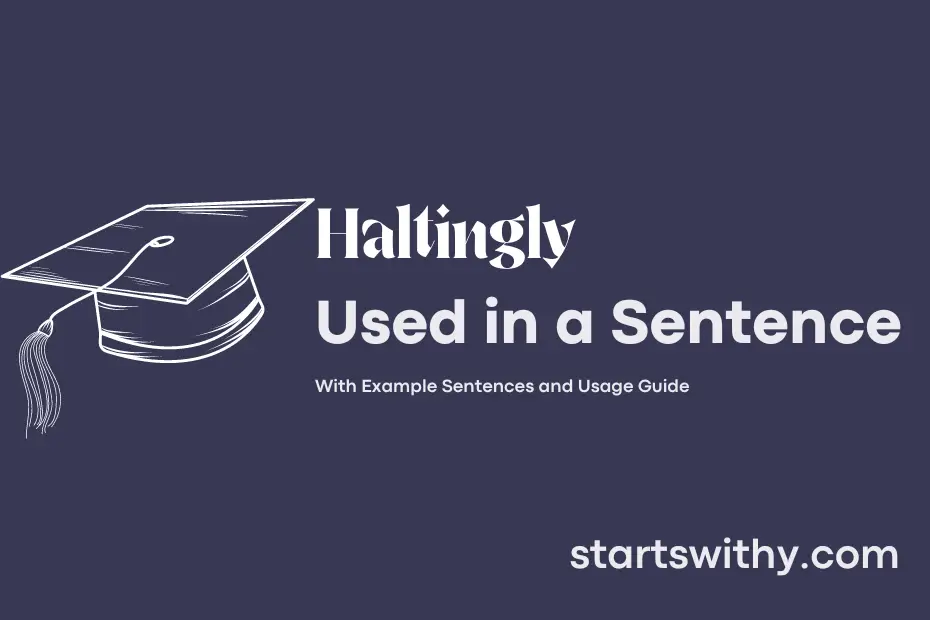Have you ever struggled to express yourself slowly and uncertainly? When someone speaks haltingly, their words come out hesitantly and unevenly, often indicating a lack of confidence or clarity in communication.
Using words in a halting manner can happen for various reasons, such as nervousness, lack of fluency in a language, or trying to carefully choose the right words. It’s a common occurrence in everyday conversations, presentations, or public speaking situations.
7 Examples Of Haltingly Used In a Sentence For Kids
- She haltingly spelled out her name during the class.
- He haltingly counted up to ten with his fingers.
- The bird sang haltingly outside the window.
- The kitten walked haltingly across the room.
- They haltingly tried to tie their shoelaces.
- The flower bloomed haltingly in the garden.
- I haltingly tried to draw a circle on the paper.
14 Sentences with Haltingly Examples
- She haltingly tried to explain her project to the professor.
- The student spoke haltingly during the presentation, struggling to find the right words.
- He answered the complex question haltingly, showing his limited understanding of the topic.
- Haltingly, she tried to ask for an extension on her assignment.
- The group of students haltingly attempted to solve the difficult math problem.
- Haltingly, he approached the professor to discuss his poor exam grade.
- The student read the passage out loud haltingly, stumbling over difficult words.
- Haltingly, she admitted to not understanding the concept despite studying all night.
- During the debate, the student spoke haltingly, unsure of their argument.
- The student haltingly confessed to plagiarizing parts of their essay.
- Haltingly, he asked a question during the guest lecture, feeling nervous.
- The student haltingly explained their absence from class due to personal reasons.
- The student haltingly declared their interest in changing majors to the academic advisor.
- Haltingly, they admitted to struggling with mental health issues affecting their studies.
How To Use Haltingly in Sentences?
When haltingly used in a sentence, it means to act or speak in a hesitant or faltering manner. This word is often used to describe someone who is struggling to continue a task or communicate their thoughts smoothly.
For example, you can use haltingly in a sentence like: “She spoke haltingly as she tried to explain her feelings to him.” In this case, it shows that the person was having difficulty expressing themselves clearly.
Another way to use haltingly in a sentence is: “The old man walked haltingly across the room, leaning on his cane for support.” Here, it describes the slow and unsteady movement of the man.
To use haltingly effectively, try to convey a sense of uncertainty or difficulty in your writing or speech. You can use it to describe a person’s actions, speech, movements, or any other behavior that lacks smoothness or confidence.
Remember, haltingly is an adverb that adds depth and detail to your descriptions. It can help paint a picture of someone struggling or hesitating, adding nuance to your writing. So, feel free to experiment with using it in different contexts to enhance your communication skills.
Conclusion
In conclusion, sentences that are spoken or written haltingly often indicate hesitation, uncertainty, or difficulty in communication. These sentences may contain pauses, repetitions, or fragmented phrases, reflecting the speaker’s struggle to convey their thoughts clearly. While such sentences can make a conversation or written text more challenging to follow, they can also provide insight into the speaker’s emotions, intentions, or mental processes.
Understanding and interpreting sentences that are haltingly spoken or written require patience and attentiveness to grasp the underlying message. By recognizing the nuances and context of halting speech, listeners or readers can offer support, clarification, or encouragement to the speaker, facilitating clearer communication and enhancing mutual understanding in the interaction.



